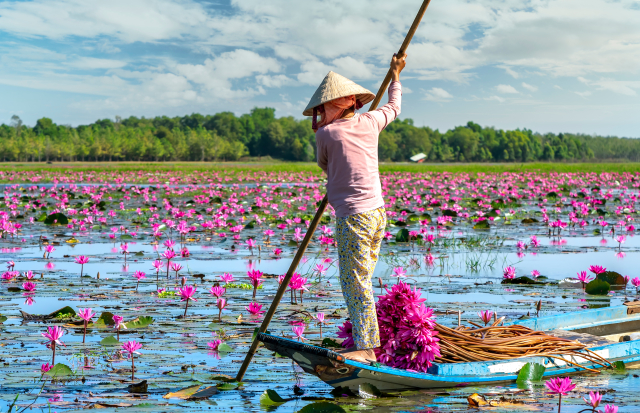
Several tools have been proposed to facilitate the adaptation processes necessary for achieving climate resilience in response to new climate and environmental challenges [1]Some of these are embedded in financial inclusion products like microfinance loans, often targeted at rural populations, especially women, in contexts where the effects of climate change have been particularly severe. The project ‘Depleted by debt? Focusing a Gendered Lens on Climate Resilience, Credit and Malnutrition in Cambodia and Tamil Nadu’ used a feminist political economy lens to analyse the effects of attempts at financial inclusion. This approach intentionally brings processes of gendered power relations to the fore in economic analysis. This focuses on the work in Cambodia where the approach allowed for critical enquiry into the consequences of debt-taking and debt management in rural areas, arguing that the current over-indebtedness crisis is, in fact, a public health crisis [2].
Cambodia is among the world’s most vulnerable countries to climate change [3]. Despite sharp declines in the past few decades, poverty rates remain high in rural areas, where many people still rely largely on subsistence agriculture for their household income [4]. The COVID-19 pandemic severely exacerbated impoverishment [5]. Against this backdrop, a lack of widespread affordable and quality health care has aggravated inequality further and trapped already vulnerable people in deeper poverty [6]. Poverty in Cambodia is closely associated not only with ill health but also with food and nutrition insecurity [7]. Economic growth and an overall decline in rates of undernourishment obscure the fact that severe disparities in food security remain, especially among rural households.
Analysis of data from our project revealed vulnerabilities within and outside households. Families were living on the ’edge‘, with limited resources and a lack of public sector support to help with social reproduction – the ordinary and ongoing activities crucial for the advancement and sustainability of societies and economies [8]– alongside the challenge of coping with external shocks. These challenges are compounded by the environmental crisis and natural resources mismanagement that has made agriculture an unreliable source of income. These circumstances were true for both men and women who participated in the study, most of whom were grandparents providing care to their grandchildren, as working-age populations had migrated to the cities or abroad for work. As such, the majority of our participants relied on remittances from their working-age children.
Rather than necessarily contributing to climate resilience, in this context, , which, in turn, exacerbates both health precarity and malnutrition. Many rural households have fewer reserves to draw on and reduced resilience in the face of shocks. Many have rightly called for more scrutiny and regulation of the financial sector especially in contexts where credit fills the gap of minimal public provisioning of health, and access to food and nutrition security. In addition, policies and interventions directed at health reforms, for example national health services, should take a holistic and multi-sectoral approach, incorporating concerns related to over-indebtedness, climate change and food insecurity to allow households to enjoy debt-free health.
The Debt-Climate-Health website has more on the report ‘’ and information about the project.
References
[1] Guermond, V., Iskander, D., Michiels, S., Brickell, K., Fay, G., Ly Vouch, L., Natarajan, N., Parsons, L., Picchioni, F. and Green, W.N. (2024), Depleted by Debt: “Green” Microfinance, Over-Indebtedness, and Social Reproduction in Climate-Vulnerable Cambodia. Antipode. https://doi.org/10.1111/anti.12969
[2] Iskander, D., and Picchioni, F. Long, L.V., Parsons, L., Guermond, V., Michiels, S., Brickell, K., Zanello, G., Natarajan, N. (2022) Trapped in the Service of Debt: How the Burdens of Repayment are Fuelling the Health Poverty Trap in Rural Cambodia. Royal Holloway, University of London.
[3] Climate Risk Profile: Cambodia (2021): The World Bank Group and Asian Development Bank. https://climateknowledgeportal.worldbank.org/sites/default/files/2021-08/15849-WB_Cambodia%20Country%20Profile-WEB.pdf (accessed: 04/04/2024)
[4] World Bank. 2017. Cambodia - Sustaining strong growth for the benefit of all. Washington, D.C. : World Bank Group. https://hubs.worldbank.org/docs/imagebank/pages/docprofile.aspx?nodeid=27520556
[5] World Bank. (2022). The World Bank In Cambodia. https://www.worldbank.org/en/country/cambodia/brief/monitoring-the-impact-of-covid-19-on-households-in-cambodia (accessed: 04/04/2024)
[6] Adélio Fernandes Antunes, Bart Jacobs, Richard de Groot, Kouland Thin, Piya Hanvoravongchai, Steffen Flessa, Equality in financial access to healthcare in Cambodia from 2004 to 2014, Health Policy and Planning, Volume 33, Issue 8, October 2018, Pages 906–919, https://doi.org/10.1093/heapol/czy073
[7] Monthivuth, K. (2011). Scoping Study on Food Security and Nutrition informaation in Cambodia. Retrieved from Asian Alliance Against Hunger and Malnutrition (AAAHM): https://www.ipcinfo.org/fileadmin/user_upload/eufao-fsi4dm/docs/Cambodia_Food_Security_Information_Scoping_Study.pdf (accessed: 04/04/2024)
[8] Bhattacharya, T. (2017). Social reproduction theory: Remapping class, recentering oppression. Pluto Press
Disclaimer
The views and opinions expressed in these articles are those of the individual authors and do not necessarily reflect the official policy or position of the Natural Resources Institute (NRI) or the University of Greenwich.
This opinion piece is part of the 2024 Gender and Social Difference Opinion Series developed in collaboration with NRI's Gender and Social Difference Research Group. We encourage you to explore the other contributions to this series.

